中俄经济对比:俄罗斯经济高度依赖自然资源出口,而中国经济则更依赖中国人创造的... [美国媒体]
quora网友:20世纪50年代的俄罗斯,比70年代的中国情况要好。但赫鲁晓夫的每一个念头都是错的。他谴责斯大林,从而把自己伪装成列宁的继承人,然而这不过是明目张胆的欺骗罢了。他还用一种伪市场经济取代了基于社会需求的计划经济,结果当然也从不起任何作用......
Comparing the Russian and Chinese economies, the Russian economy is heavily dependent on natural resource exports, while the Chinese economy is more d
中俄经济对比:俄罗斯经济高度依赖自然资源出口,而中国经济则更依赖中国人创造的...
Gwydion Madawc Williams, Read a lot about this
Answered Jul 28, 2018
Gwydion Madawc Williams,读过很多这方面的东西
Russia in the 1950s was better placed than China in the 1970s.
Khrushchev had all the wrong ideas. Denouncing Stalin and pretending he was Lenin’s heir, which was blatantly false. And replacing planning based on social need with a pseudo-market that never worked well.
20世纪50年代的俄罗斯,比70年代的中国情况要好。
但赫鲁晓夫的每一个念头都是错的。他谴责斯大林,从而把自己伪装成列宁的继承人,然而这不过是明目张胆的欺骗罢了。他还用一种伪市场经济取代了基于社会需求的计划经济,结果当然也从不起任何作用。
The Soviet Bloc was doing well until the 1970s, see The Mixed Economy Won the Cold War.
Russia in the post-Soviet era blundered again, allowing crackpot New Right ideas that China never allowed. See Who Lost China? | National Review
70年代之前,苏联一直运转得还不错。参阅《混合型经济赢得冷战胜利》。
https://gwydionwilliams.com/99-p ... -worked-quite-well/
然而到了后苏联时代,俄罗斯又犯下愚蠢的错误,她容许了在中国绝不会被允许的不切实际的新右倾思想。参阅《国家评论》的《谁失掉了中国?》
https://www.nationalreview.com/m ... ions-who-lost-them/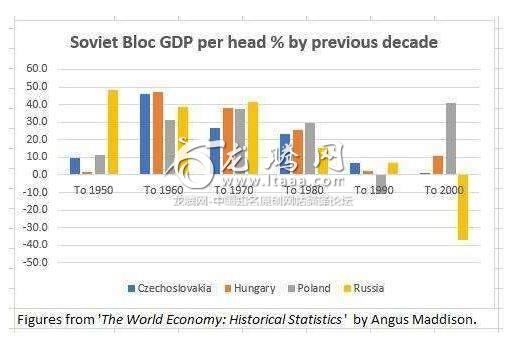
苏维埃集团国家国内生产总值(GDP)每10年的增幅
(四色柱分别代表:捷克斯洛伐克(Czechoslovakia),匈牙利(Hungary),波兰(Poland),俄罗斯)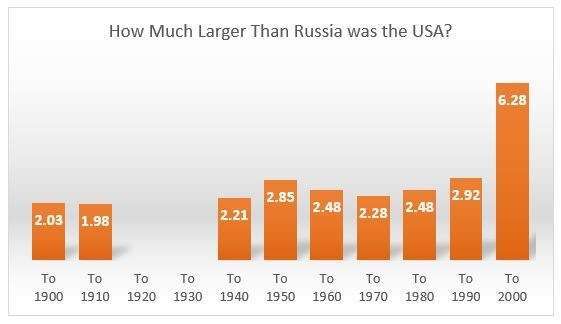
美国经济比俄罗斯大多少(柱状图形上的数字表示倍数)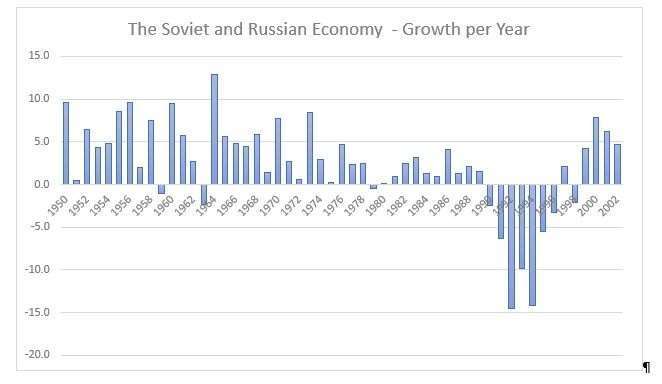
从苏联到俄罗斯的年经济增长率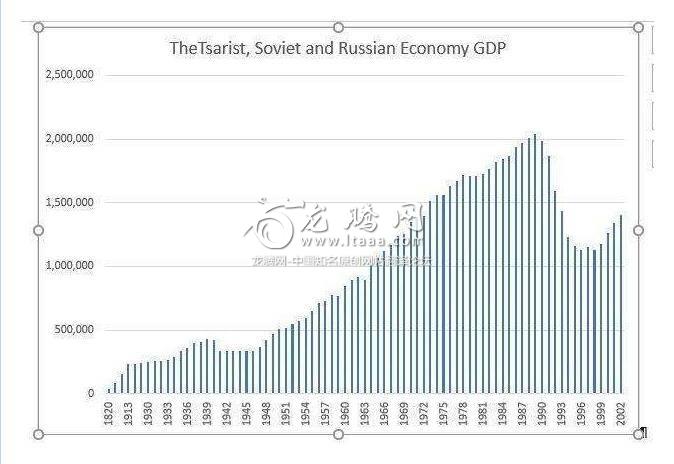
沙俄、苏联、俄罗斯时期的各年GDP情况
--------------------2--------------------
Tatyana Astakhova
Answered Jul 23, 2018
In China, people who care about the technical development of the country rule because they understand that this is the Force.
And in Russia there is a bunch of oligarchs, for whom the Russian ethnos are strangers. They just pump out resources and they do not care about the development of the country.
在中国,管理层是一群关心国家科技发展的人,因为他们懂得科学就是力量。
但在俄罗斯,则是一群寡头,对他们来说俄罗斯民族只不过是陌路人。他们只是想着如何抽空这里的资源,而从不关心国家的发展。
--------------------3--------------------
Greg Kemnitz
Answered Jul 21, 2018
The “China model” started out with Deng Xiaoping’s “Cat doctrine” rejection of doctrinaire Communism - “it doesn’t matter if the cat is black or white, if it catches mice, it’s a good cat” - and started following the export-driven industrialization path established by Japan, South Korea, and especially the ethnic Chinese areas of Taiwan and Hong Kong, and - a bit later - Singapore. None of these areas has much of anything in natural resources, either because they’re physically very small, or are resource-poor volcanic rocks in the sea.
“中国模式”始于邓小平用“好猫原则”摒弃了教条主义的GC主义——“不管黑猫白猫,抓住老鼠就是好猫”——并开始遵循由日本,韩国,特别是属于中华地区的台湾和香港——还有稍后的新加坡——所建立的以出口驱动的工业化道路。这些地区无一例外地缺乏自然资源,要么因为他们地理面积狭小,要么本身就是由贫瘠的海洋火山岩构成。
--------------------4--------------------
Dima Vorobiev, I worked for Soviet propaganda
Answered Jul 18, 2018
Dima Vorobiev,我曾为苏联宣传部门工作
China was a settled agricultural civilization with several thousands years of written history, cultural continuity and managerial traditions beneath its belt.
Russia was a colonization project of a small group of state/military aristocracy. The wealth of our civilization most of the time was dependent not on the labor of peasants toiling the land, or the skills of state managers organizing their work, but on expanding territories and pumping them for pelts, honey, wax, slaves, timber and mineral resources.
中国是一个成熟的农业文明,拥有数千年有文字记载的历史,在国家的外表之下是她的文化延续性和管理传统。
俄罗斯则是一个由国家/军事贵族集团进行殖民计划的产物。我们的文明财富大多数时候不是依赖农民耕耘土地的劳作,或组织这些劳动的国家管理技巧;而是通过领土扩张,然后从新得到的领土上获取毛皮、蜂蜜、蜡、奴隶、木材和矿产资源。
Which is why the primary application the Chinese found for the modern technology has been manufacturing. While we predictably prefer to use it for export-oriented extractive industries, as well as for producing weapons and other means of defending the perimeter. The strategic advantage of the Chinese is their vast pool of hard-working, still relatively inexpensive workforce. Our strategic advantage is our vast expanses with an immense wealth hidden beneath them. They specialize on what they do best, we capitalize on what the nature has given us.
这就是为什么中国人把现代技术主要应用到了制造业;与此同时我们则不出意料地更倾向于将现代技术用于出口导向的采掘业,当然还有制造武器及其它周边防卫手段。中国人的战略优势,是他们勤劳且仍相对廉价的庞大劳动力资源;而我们的战略优势则是广阔的幅员,以及埋藏于其下的无尽财富。中国人专注于他们最擅长的事,而我们则利用大自然的恩赐。
The poster below is from the 1970s. It hails the construction of the export pipeline Urengoi-Pomary-Uzhgorod from West Sibiria to Europe. The rhymed text says: “We’re honored by the Motherland’s order—we’ll deliver the Siberian gas on schedule!” During its first decades, the Soviet rule made the most determined effort ever of modernizing Russia and diversifying our economy. However, a combination of the worsening economic ineffectiveness and the discovery of massive exportable petroleum deposits in Siberia in the 1960s increasingly have been dragging us back into the old paradigm of extractive economy.
下面是一幅20世纪70年代的海报。海报歌颂的,是从西西伯利亚到欧洲的乌廉戈伊气田(Urengoi)——波马雷(Pomary)——乌日哥罗德(Uzhgorod,乌克兰城市)天然气出口管道工程。上面的韵文写着:“祖国的使命令我们光荣无比——誓要按时交付西伯利亚天然气!”在苏联的头几十年,统治者也作出过最坚定的努力,要让俄罗斯实现现代化,同时使我们的经济多样化。然而,20世纪60年代一个奇怪的历史组合——西伯利亚低效的经济严重恶化,同时却在那里发现了大规模可开采石油矿床——自那时起,我们就一直在被重新拖回到旧有的采掘型经济模式。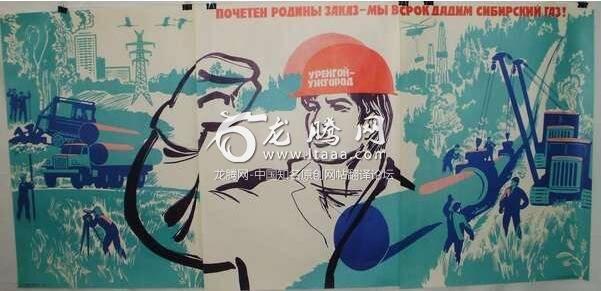
--------------------5--------------------
Randall Burns, BA Economics, University of Chicago (1981)
Answered Jul 18, 2018
Randall Burns,芝加哥大学经济学学士(1981)
China has a huge population. The reason is that China has land that with the right irrigation infrastructure in place is productive enough to support a substantial population.
China vs Russia: Agriculture Facts and Stats
中国人口众多。这是因为中国配以适宜的灌溉基础设施的土地足够高产,从而支撑起了大量人口。
参阅《中国 VS 俄罗斯:农业现况与统计》
http://www.nationmaster.com/coun ... /Russia/Agriculture
China has more than twice as much agricultural land in production as Russia, even though Russia as a lot more overall land. However, Russia has more land area and with that comes a lot of mineral wealth.
The only way for China to develop economically is value added activities like manufacturing. Russia has other options.
Russia tried hard to develop a manufacturing economy, but had some real problems in that process when it went much beyond their military infrastructure.
尽管俄罗斯总面积要大得多,但中国的农业用地面积却是俄罗斯的两倍多。然而,俄罗斯更广阔的土地,为它带来了大量的矿产财富。
中国要发展经济,只能通过像制造业这样可以创造附加价值的途径。而俄罗斯有别的选择。
俄罗斯也曾努力尝试过发展制造业经济,但在这一过程中,一旦远离了他们的军事基础设施,真正的麻烦就出现了。
--------------------6--------------------
Joseph Holleman, CEO of Magister Technologies Inc., Author of "The Prosperity Clock" book series.
Answered Jul 17, 2018
Joseph Holleman,麦吉斯特科技公司首席执行官,《繁荣时钟》丛书作者。
I believe the answer to this lies in two different mindsets about how to best manage the economy of each country by its leaders.
我认为问题的答案在于两种截然不同的心态,即两国领导层认为如何才能最好地管理本国经济。
I suggest that the CCP has come to realize that the true wealth of China lies in the productivity of its people. And I would also suggest that they had a perfect laboratory to work with to come to that conclusion in the form of Hong Kong and Singapore who built thriving economies with virtually no natural resources except the productivity of their people. Perhaps the relatively high concentration of engineers and scientists within the CCP may explain this. But China chose to trust the ingenuity and productivity of its people to lead the way, with guidance from the CCP.
我猜CCP是认识到了中国真正的财富在于人民的生产力。我估计,他们有一个完美的实验室来帮助他们得出上述结论——那就是香港和新加坡,他们除了自己人民的生产力,几乎没有任何自然资源,却实现了经济繁荣。或许,CCP内部工程师和科学家的数量相对较多可以证明这一点。总之中国选择了相信自己人民的智慧和生产力,并由CCP指引着前进。
Russia, and the former Soviet Union, has been primarily ruled by military men, former spies, etc., who don’t trust as much in their people because, if given enough incentive and opportunity, their people would likely rise up and demand their heads on a spike just as they did the Czars before them. Natural resources are far more easily controlled centrally and by a few key people that aren’t so likely to rebel.
俄罗斯,以及前苏联,则基本上由军人、前间谍人员等统治,他们可不那么信任自己的人民,因为如果给予足够的激励和机会,他们的人民很可能会揭竿而起,就像对待之前的沙皇一样要了他们的脑袋。自然资源则更容易被集中控制在少数不太可能叛变的关键人物手上。
But future technology trends are not going to be kind to natural resource based economies. Eventually, to survive, Russia is going to have to become more like China and trust that its true wealth is in the productivity of its people just as the CCP has done. And that will mean it will have to start putting a lot more trust in its people than it currently does.
但未来的技术发展趋势不会有利于资源依赖型经济体。最终,为了生存,俄罗斯将不得不变得更像中国,也更像CCP那样,相信真正的财富蕴藏于人民的生产力之中。而这将意味着它必须开始比现在更加信任它的人民。
And that is also a lesson that all resource rich countries need to learn going forward, whether currently rich, poor, or in between.
True wealth and prosperity lies with your people, not your resources.
这也是所有资源丰富国家需要学习的课程,无论他们目前是富裕,贫穷,还是在两者之间。
真正的财富和繁荣蕴藏于你的人民,而非资源当中。
--------------------7--------------------
Jerry Mc Kenna, I have voted in the US since 1972
Answered Jul 17, 2018
Jerry Mc Kenna,自1972年起我就在美国参加投票了
History is Russia’s worst enemy. For reasons that are obvious the Soviets after WWII concentrated too much on their military. The state owned industries were always backward and inefficient. In a world where consumer goods were a great avenue towards growth the Soviets didn’t produce anything wanted internationally. I am familiar with Soviet made cameras and their stuff was a generation behind, in part because they were using designs and equipment created in Germany and taken back to Russia. They had a native camera industry that was building 1938 style cameras in 1955. If you look at Soviet calculators you see the same backwardness.
历史是俄罗斯最大的敌人。出于显而易见的原因,自第二次世界大战(WWII)以后,苏联就把太多精力放到了军事发展上。当时各个国营行业始终处于落后、低效的状态。在一个制造生活消费品成了通向经济成长的康庄大道的世界里,苏联不生产任何能满足国际需求的产品。我对苏联生产的相机很熟悉,而它们总是落后一代,部分原因是苏联人使用的设计、设备都是德国人先搞出来,后来才被带回俄罗斯的。他们有一个本土相机产业,在1955年时还在生产1938年款式的相机。如果你去研究苏联生产的计算器,你会发现同样的落后状况。
--------------------8--------------------
Orlando Barrios, works at Miskatonic University
Answered Jul 16, 2018
Orlando Barrios,在米斯卡塔尼克大学工作(一所游戏里的学校?)
I don’t know how correct is this comparison, but anyway…
I’d say that the original difference lies in the assigned role of the economy in the nation’s life.
我不知道这样对比是否恰当,但无论如何……
我想说,二者差异的根源在于社会生活中经济被赋予的角色不同。
The Chinese leadership chose to use the power of the Party to transform China’s economy from the agrarian one of the Maoist era into an industrial powerhouse: but for this the Party has changed its politics to cater to the economy, changing to accomodate its own version of capitalism.
中国领导人选择运用党的力量,将中国经济从毛主义时代的仍以农业为主,向工业化转变;但也正因如此,党为了满足经济建设需要,也改变了它的政治面貌,成为了一种独有的资本主义模式。
And yet, the Party is still in control, because the Party commands the corps, and the corps must never be allowed to command the Party.
But unlike China’s orderly transformation, Russia post-1991 was in free fall under the tender cares of the oligarchs and their Western friends. Impoverished & tired, the People allowed Putin to take control.
然而,党仍然掌握控制权,因为党指挥着军队而绝不允许军队指挥党。
与中国的有序转型不同,1991年后的俄罗斯在寡头和他们的西方朋友的“温柔关怀”下出现了自由落体式的衰落。贫困加上疲惫,人民最终选择了普京出来掌管一切。
And he chose to put the economy at the service of his own policies: recovering stability, growth, military might and international stature.
With China increasing its consumption and with the Middle East destabilized by the US, it was the time to use Russia’s vast and barely tapped natural resources to start growing again.
而他的选择是让经济服务于他自己的政策:恢复稳定、增长、军事力量和国际地位。
随着中国的消费增长,以及美国制造的中东局势动荡,是时候让俄罗斯储量庞大而几乎未被开发的自然资源重新开始增长了。
But this growth hasn’t been married with competitiveness & exportations, as in China: if Russia produces planes, trucks and cars, who is buying them? In Africa, Asia and Latin America, which is easier to find: FAW or Kamaz? Changan or AvtoVAZ?
但这一增长,并没能像中国那样,与竞争力、出口能力结合起来:如果俄罗斯生产飞机、卡车和汽车,有谁会购买呢?不论是在非洲、亚洲还是拉丁美洲,哪一个更容易找到:一汽(FAW = First Automobile Works)还是卡玛斯(Kamaz,俄卡车品牌)?长安还是奥托瓦兹(AvtoVAZ,俄轿车品牌,亦称伏尔加牌)?
These companies are sustained with oil money, but have little influence beyond creating jobs: they exists to keep people employed and in support of Putin. As long as this situation doesn’t change, there is little incentive for Russia to stop its dependence on oil and use its industrial muscle to compete internationally.
这些公司是靠石油资本维持的,但除了创造就业岗位外几乎没有任何影响力:它们的存在只是为了保障人们就业,从而支持普京。只要这种情况不改变,俄罗斯就没有什么动力摆脱对石油的依赖,去发展工业实力参与国际竞争。
--------------------9--------------------
Gabriel Chan, Overseas Chinese(华侨)
Answered Jul 16, 2018
Gabriel Chan,海外华侨
--------------------10--------------------
Chris Dai
Answered Jul 16, 2018
China cannot feed its people by exporting natural resources. So the government need to find another way to feed its people. From the experience of the development of western countries, manufacturing is a good idea. With the help of USSR between 1950–1960, China built its own industries, which made it possible for China to be the factory of the world after 2001.
中国靠出口自然资源可没法养活自己的人民。所以政府必须寻找另一种方式来满足人民生活需求。从西方国家的发展经验来看,制造业是个不错的选择。而1950~1960年间,在苏联的帮助下,中国建立起了自己的工业,这使得中国在2001年后成为世界工厂成为可能。
If there were less than 100 million people in China, maybe China would also be a natural resources exporting nation like Russia and Australia. Every one wants to make easy money, but most of us cannot do it due to lots of factors, then you need to work much harder to make a living. When you finally made it, you will find yourself much more competitive than those who make easy money.
如果中国的人口少于1个亿,那么中国或许也会成为像俄罗斯和澳大利亚这样的自然资源输出国。每个人都想轻松赚钱,但是由于各种原因,大多数人都做不到。那么你就只能靠加倍努力地工作来谋生。而当你最终成功时,你会发现自己远比那些轻松赚钱的人更有竞争力。
版权声明
我们致力于传递世界各地老百姓最真实、最直接、最详尽的对中国的看法
【版权与免责声明】如发现内容存在版权问题,烦请提供相关信息发邮件,
我们将及时沟通与处理。本站内容除非来源注明五毛网,否则均为网友转载,涉及言论、版权与本站无关。
本文仅代表作者观点,不代表本站立场。
本文来自网络,如有侵权及时联系本网站。
图文文章RECOMMEND
热门文章HOT NEWS
-
1
Why do most people who have a positive view of China have been to ...
- 2
- 3
- 4
- 5
- 6
- 7
- 8
- 9
- 10
推荐文章HOT NEWS
-
1
Why do most people who have a positive view of China have been to ...
- 2
- 3
- 4
- 5
- 6
- 7
- 8
- 9
- 10













